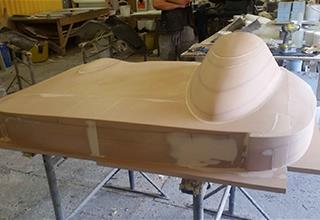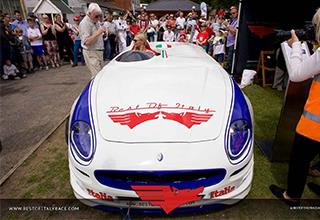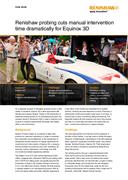Por el momento, esta página no está disponible en español. Puede obtener una traducción automática mediante la opción de traducción de Google.
No podemos responsabilizarnos de este servicio puesto que podemos no verificar los resultados de la traducción.
Si desea más información, póngase en contacto con nosotros.
Renishaw probing cuts manual intervention time dramatically for Equinox 3D
As a specialist producer of fibreglass products across a wide variety of industries, Equinox 3D is often approached with intricate and bespoke designs. Thanks to the introduction of Renishaw probing systems to its manufacturing process, the company based in Faversham (UK), is able to meet the most unusual of customer requirements accurately and reliably within a short time frame.
Background
Equinox Products began as a producer of glass fibre products for customers operating in a range of industries; from automotive and architectural, to the manufacture of amusement arcade machines. Its regular requirement for mould tools led to the creation of Equinox 3D; a company that has evolved to provide four-axis CNC machining, 3D scanning, reverse engineering, CAD design and other non-mould tool related engineering activities.
The addition of an XYZ 1020 Vertical Machining Centre (VMC), equipped with a Renishaw OMP40 part setting probe and a TS27R tool setting probe, has greatly improved the productivity of Equinox 3D. Despite working to tolerances of ±0.1 mm rather than microns, Equinox 3D finds probing a valuable addition to its manufacturing process. With all of its work being visible and tactile, aesthetic appearance is key. Many of the moulds are assembled from multiple sections, meaning accurate alignment is crucial. Previously, a multi-section mould would require many hours, if not days, of manual input in terms of polishing, fitting and finishing. This frequently added both time pressure and cost to the process, and time is a commodity that Equinox 3D simply does not have. A recent time-critical job is a typical example.
Challenge
“We were approached out of the blue by the organisers of the Best of Italy Festival, a two-day event in Emilia-Romagna Piacenza, Castell'Arquato, culminating in a hill climb featuring Italian supercars, superbikes and pedal cycles,” says Darren George, Technical Director, Equinox 3D. “Their requirement was to re-create a concept car produced by Maserati; the Super Monoposto.
The starting point for this was a standard Maserati 4200, which had its soft top and windscreen removed with an angle grinder. “With a date set for the festival and certain processes with fixed time, we were left with a couple of weeks to completely design and manufacture the new fibreglass monoposto cover for the cockpit area, ready for the car's unveiling at Brooklands with its celebrity driver; model and TV presenter, Jodie Kidd,” explains Darren George.
The canopy stretched from the rear of the car and covered the passenger area, leaving just the driver exposed to the elements. This required Equinox 3D to machine a multiple section pattern; 16 sections in total. These sections had to fit together accurately to ensure that the fibreglass mould would require the minimum of hand finishing.
The ease of use and accuracy that we gain from knowing exactly where things are in relation to the CAD data is invaluable and combining the probing with CAD data is a seamless process for us. This item simply had to fit to the location points that we were given. Probing gave us the confidence that we could achieve that.
Equinox 3D (UK)
Solution
A Renishaw OMP40 part setting probe was used to set the datum of each of the 16 blocks of 0.7 density PU modelling board. Using probing, setting the datum took around one minute per block. Previously, simply setting the datum in the X and Y axes would take 3-4 minutes for each axis, and the Z axis datum could take as long as five minutes to set.
The Renishaw probe saved Equinox 3D in the region of three hours in set-up time alone. Probing was especially beneficial due to the time pressure of the job in question. “We had to run the machine 24/7 over 10 days to get the moulds produced on schedule, which meant coming into the workshop at midnight to set up the next block. At that time of night, the fact we could set datums automatically was a major bonus,” says Darren George.
Given that most of its production is of freeform shapes, Equinox 3D also makes full use of the Renishaw OMP40 probe for on-machine post-process inspection. The probe is used to confirm that datum points match up with CAD data prior to the part being removed from the machine. Similarly, Equinox 3D uses the Renishaw TS27R tool setting probe to confirm and amend tool offsets in-process. This again ensures parts are machined accurately first time.Results
While these on-machine time savings through use of the Renishaw OMP40 probe are significant in themselves, the most significant time savings occurred once the 16 sections were assembled. Darren George estimates that a mould of this type and size would normally require between one and two days of hand finishing. This was virtually eliminated thanks to the accuracy of the initial machining. This meant that assembly was straightforward, with minimum discrepancies between neighbouring sections.
“Time was the most critical factor on this job and we delivered the finished and painted monoposto canopy with 12 hours to spare. Without probing this would not have been possible. We had one chance with this project, and a finished product that was 2.4 metres in length, which had to fit a 3D shape that we didn't have any CAD data for, brought into focus the tolerance issue,” explains Mr George. “While we may not be working to microns, this item simply had to fit to the location points that we were given. Probing gave us the confidence that we could achieve that.”
And, although the company employs 3D non-contact scanning technology, this has its limitations when it comes to some small internal features. Here again, it turns to its Renishaw OMP40 probe to accurately datum these features. This capability is especially useful when reverse engineering intricate components. A recent project which involved the production of a bell housing for a gearbox of a kit car would have been extremely difficult without the capability enabled by Renishaw probing systems.







